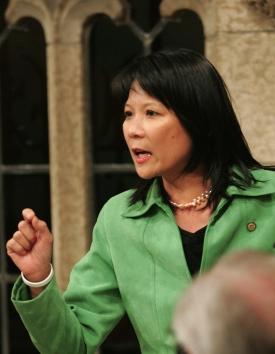Mention of gay rights and same-sex marriage will be included in the next printing of the Canadian citizenship guide.
“It’s something that I’m very pleased that they’re finally getting around to restoring, but they’re only doing it because of pressure and outrage from opposition parties and from rights groups across the country,” says Liberal immigration critic Justin Trudeau.
Trudeau points to the revelations by The Canadian Press in March that proposed sections on gay and lesbian rights were removed by Immigration Minister Jason Kenney’s office.
“There’s that telling blank space where it should go in the original guide, and now that they’ve responded to pressure, they’re putting it back,” Trudeau says. “It’s a good thing they’re not being stubborn like they can be on other situations, but it’s a shame that it had to come to this, to get them to recognize something that’s a part of modern Canada.”
“Obviously we weren’t happy that they left it off in the first place and that they didn’t include it, but they’ve corrected that, and we’re happy that they have,” says Egale Canada executive director Helen Kennedy. “I think it’s a positive thing for our community and for new immigrants.”
While Kennedy did meet with Kenney over the issue, NDP immigration critic Olivia Chow led the charge both at the Commons citizenship and immigration committee and in the House of Commons.
“Obviously the minister conceded defeat,” Chow says, and she adds that while she found out that the changes were going ahead before the summer break, she was waiting until she saw the documents before she believed it. At Wednesday’s meeting of the committee, Kenney’s parliamentary secretary, Rick Dykstra, brought the proposed guide.
While the department is still finalizing the wording, as it stands the draft reads as follows:
“Our laws protect all Canadians, including gays and lesbians, from unjust discrimination. All Canadians enjoy the same access to education, health care, jobs, housing, social services, and pensions, regardless of their sexual orientation. In 2005, Parliament passed a law extending the right to civil marriage to same-sex couples. At the same time, the law respects religious freedom, so no church, synagogue, mosque or temple can be forced to perform a marriage that goes against the religious beliefs of its members.”
There is also expected to be mention that Canada’s labour laws prohibit unfair treatment on the basis of sexual orientation.
“I read through the wording very carefully, and it was fine,” Chow says. Nevertheless, the need to point out that religious institutions are not obligated to perform same-sex marriages does stand out to critics.
“I wouldn’t have put it in there, but I suppose if the whole notion of religious freedom is also a right, so if some people feel that because they don’t want their mosque to marry lesbian couples, then that’s up to the mosque,” Chow says.
“They’re Conservatives,” Trudeau says. “They’re not comfortable with the Charter, and it shows up in a whole bunch of ways. They’re going to put their spin on it. I’m not going to make too much hay about it because it’s a wording that I wouldn’t have chosen or a Liberal government wouldn’t have chosen, but at least they’re recognizing the rights, so I’m going to give them props for that at the very least.”
Kennedy is quick to applaud Chow for her efforts on getting the sections restored.
“Kudos to Olivia, but in fairness to Kenney, and it doesn’t happen very often, when I did meet with him late last year, he told me that they would fix it in the first reprint, and he’s fulfilled that commitment,” Kennedy says.
“They’ve actually done that — fairness where fairness is due. I can’t criticize them for that. We can criticize for leaving it out in the first place, but he has fixed the error, and I’m very happy that they’ve done that.”
“I think having three hours of debate in the House of Commons made a difference,” Chow says.
She also points to the interventions made by queer groups like Egale and the Rainbow Refugee Committee during the hearings before the committee on Bill C-11, which reformed the refugee system.
“There were some very passionate speeches by the gay and lesbian community on refugee law, but it also showed how much muscle they have, and I don’t think the minister wanted to have an all-out war with them,” Chow says, crediting the queer community for getting the changes on the “safe country of origin” clause through.
“I guess the Conservatives feel they’re not an enemy they want to tangle with,” Chow says.


 Why you can trust Xtra
Why you can trust Xtra


